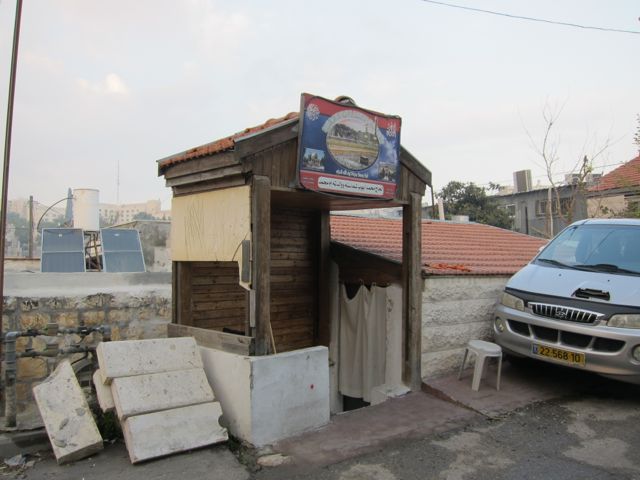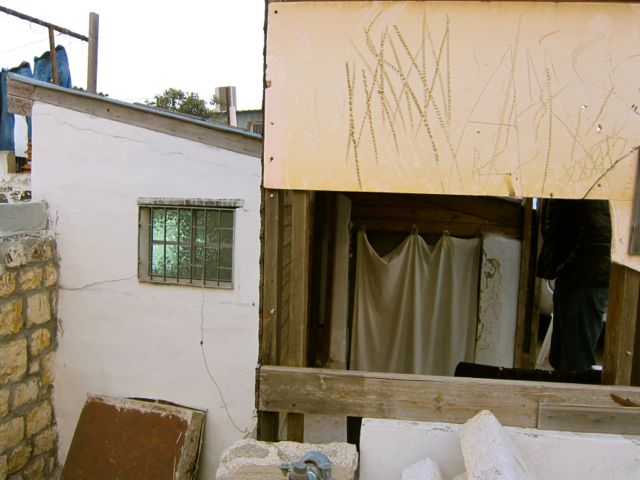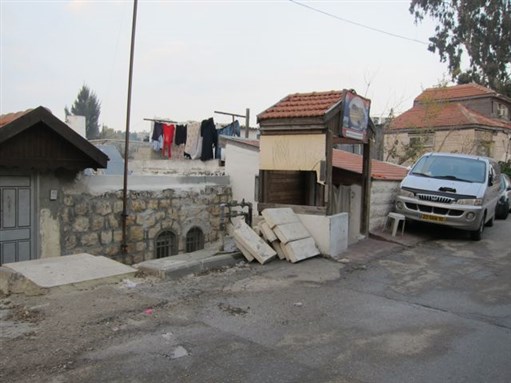On Monday 31 December 2012, Israeli forces will evict the Shamasneh family from their home in Sheikh Jarrah. The family of ten, including six children, have lived in the home since 1963. Ayoub Shamasneh, the family elder, recently appealed to the international solidarity community to stand with them to resist their forced displacement.
Sheikh Jarrah is a residential neighborhood in the north of the Old City of Occupied East Jerusalem and home to 2,800 Palestinians. Due to its strategic location around the Old City, It has been the site of an aggressive ethnic cleansing campaign. In 2009, Israeli settlers, supported by Israeli state forces, forcibly removed the Hanoun and the Al-Ghawi families (fifty-three people, including twenty children) from their homes.
More recently, a group of Jewish-Israeli settler young men took over part of the Al-Kurd family home. Nadia Al-Kurd explains that they release their dog on them frequently, which has terrified their children and caused injuries. In response to international solidarity campaigns aimed at supporting the Al-Kurd family in reclaiming their confiscated property and remain in their home, the settlers poured sewage over the solidarity encampment to drive them away. Today, the Al-Kurd continues to live in constant fear of settler violence and further control of their home.


[The Shamasneh home in Sheikh Jarrah, East Jerusalem]
The ethnic cleansing campaign targeting the Sheikh Jarrah neighborhood threatens to forcibly displace approximately sixty families or nearly seven hundred people. Sheikh Jarrah is among several Palestinian cities surrounding East Jerusalem at high risk of forcible displacement. Other cities include Issawiyyeh, Shuffat, Beit Hanina, Beit Iksa, and Silwan. According to Jerusalem`s Master Municipal Plan (2000), Israel has an explicit policy of reducing the ratio of Palestinians in East Jerusalem, which would otherwise equal the city`s Jewish population by 2030 due to natural population growth. In February 2012, the UN Special Rapporteur on Housing, Raquel Rolnik, described Israel`s policy as a Judaization campaign targeting Palestinian communities within Israel Proper as well as the Occupied Territory.
.jpg)
[Entering Sheikh Jarrah in East Jerusalem]
According to Palestinian journalist Dalia Hatuqa, the eviction has been postponed until Thursday. On 30 December 2012, we were able to speak with Dirar Shamasneh outside his home. He describes his family`s ordeal and their determination to resist forced displacement. See the brief video below, and a translated transcription of the video beneath it.
[Update: the case is now postponed until March, 2013. See press release here.]
Additional Sources:
- BADIL, Jerusalem: A Displacement Master Plan - Interview with Khalil Tafakji
- UN OCHA, The Case of Sheikh Jarrah
- HAARETZ, Jerusalem master plan: Expansion of Jewish enclaves across the city
[We wish to thank the superb efforts of Daoud Ghoul in helping us navigate the local context in Palestine]
Home Eviction Order from Jadaliyya on Vimeo.
Translated Trascription:
Dirar Shamasneh (DS): I just want to say that we have been living in this house since 1963. Meaning, my grandfather was the one living in it. The house was in ruins, and my grandfather is the one that fixed it up. Then my father fixed it up another time. A while ago, they sent us an order that [unclear] and that we would have to vacate it.
We filed with the District Court and lost our case there. We then filed an appeal with the Supreme Court, which we are still waiting to hear from. But the ruling of the District Court is that we have to vacate the house on the thirtieth of this month.
Bassam Haddad (BH): Meaning, tomorrow?
DS: Tomorrow, on the thirty-first. Meaning, the end of the month. We still do not know what we are going to do.
BH: What does it mean that you have to vacate the house. Are they going to come tomorrow?
DS: Yes, tomorrow they are going to come and remove us.
BH: Are you prepared in some way?
DS: No.
BH: So you are going to refuse?
DS: Of course. We are not going to leave. Where are we going to go?
BH: Is there going to be solidarity with you, on the part of the neighbors?
DS: Yes, the solidarity activists are with thus. They come to the neighborhood every Friday. They want to set up a tent.
BH: You are not planning on leaving?
DS: No. We are not planning on leaving.
BH: There is nowhere for you to go?
DS: No. There is no place for us to go. This is our home, since a long time ago.
BH: How many persons are living here?
DS: Ten.
BH: Ten?
DS: Six brothers, my mother and father, as well as my grandmother and grandfather.
BH: Okay. Would you like to say something?
DS: No, that is it.
BH: If you would like, can you please tell us your name?
DS: Dirar Mohammed Shamasneh.
BH: Dirar?
DS: Dirar.
BH: Oh. My friend`s name is Dirar. Thank you very much Dirar.
DS: You are welcome.
[Transcribed by Ziad Abu-Rish]









